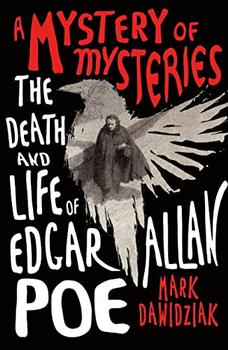Summary | Excerpt | Reviews | Beyond the Book | Readalikes | Genres & Themes | Author Bio

The Death and Life of Edgar Allan Poe
by Mark DawidziakExcerpt
A Mystery of Mysteries
Having completed just forty years of what was without question a most stormy life, Edgar Allan Poe took leave of this realm early Sunday morning, October 7, 1849. Nobody knows precisely why. Indeed, like so many aspects of his life, his death has been the topic of endless debate, conjecture, speculation, guessing, and second-guessing. Nobody can tell you with anything resembling certainty why, while traveling from Richmond to New York, he ended up in Baltimore. Nobody can tell you what happened to him during the missing days between his last sighting in Richmond on the evening of September 26 and his reappearance outside an Election Day polling place in Baltimore on the damp, chilly afternoon of October 3. Nobody has ever solved the identity of the person, Reynolds, for whom Poe supposedly called out for hours before he died at the Washington University Hospital of Baltimore. Nobody has ever produced conclusive evidence, or so much as a first cousin to it, regarding the cause of the delirium generally described as "congestion of the brain," "cerebral inflammation," or "brain fever." Even the melodramatic and rather pat last words attributed to him—"Lord help my poor soul!"—have been called into question. The source for that dying utterance is a shaky witness who trafficked in contradictory testimony, attending physician John J. Moran (who may or may not have been in attendance at the time of death). The one thing that can be said with absolute certainty is that Edgar Allan Poe died at the age of forty years, eight months, and change because he stopped drawing breath.
No matter how much the twisted record gets set straight, though, and no matter how many mysteries get solved, there will always be much about Poe that remains unknowable. We can never completely dispel the shadows that surround him. Rest assured, we will never lose the enigmatic Poe, and that's because the trail of evidence is positively littered with unreliable witnesses, contradictory statements, questionable memories, and missing time. Sifting through it all, you're reminded of the line from Poe's satirical story "The System of Doctor Tarr and Professor Fether": "Believe nothing you hear, and only half that you see." That's a bit extreme, and it must also be conceded that, sooner or later, any biographer writing about any subject must regularly cope with murky areas by falling back on such old reliable standards as evidently, seemingly, presumably, and apparently. But with Poe, these get an even more rigorous workout, and, while you're at it, you can toss in supposedly, likely, possibly, and maybe. This is not by any means a criticism. It is a simple acknowledgment of a necessity—a constant requirement—when dealing with aspects of Poe's life and death. "Around his name has accumulated a mass of rumor, conjecture, psychoanalysis, and interpretation based upon imagination rather than fact," Quinn wrote in his biography of Poe, setting the standard for decades of scholarship to follow. With Poe, it's often less a matter of what we know with absolute certainty and more a matter of settling for what we think we know.
"That's true of his death in spades, but it's also true of his life," said Jeffrey A. Savoye, the secretary and treasurer of the Edgar Allan Poe Society of Baltimore and the webmaster who oversees that organization's extensive and invaluable online archive of Poe material. "We accept a lot of information about Poe in absence of strong contradiction. And there's unquestionably a lot of information about Poe. But for a lot of it, we don't really have a way of verifying whether it's true or not."
You're continually reminded of this when grappling with the mysteries that have enveloped Edgar Allan Poe. You're also constantly reminded what a brief life he lived. Poe wrote so much of such high quality in so many different genres that he leaves the illusion of a complete literary life. The accomplishments are so impressive and influential, we might not give due consideration to the notion that he died at an age when many writers are just entering their prime—that forty-to-sixty sweet spot when maturity and experience can propel an artist to greater heights. "There is that arc of improvement with Poe," Peeples said. "It created the impression that he did what he was meant to do. There's such symmetry to it all, you don't tend to think of it as a career cut short."
Excerpted from A Mystery of Mysteries by Mark Dawidziak. Copyright © 2023 by Mark Dawidziak. Excerpted by permission of St. Martin's Press. All rights reserved. No part of this excerpt may be reproduced or reprinted without permission in writing from the publisher.
Your guide toexceptional books
BookBrowse seeks out and recommends the best in contemporary fiction and nonfiction—books that not only engage and entertain but also deepen our understanding of ourselves and the world around us.